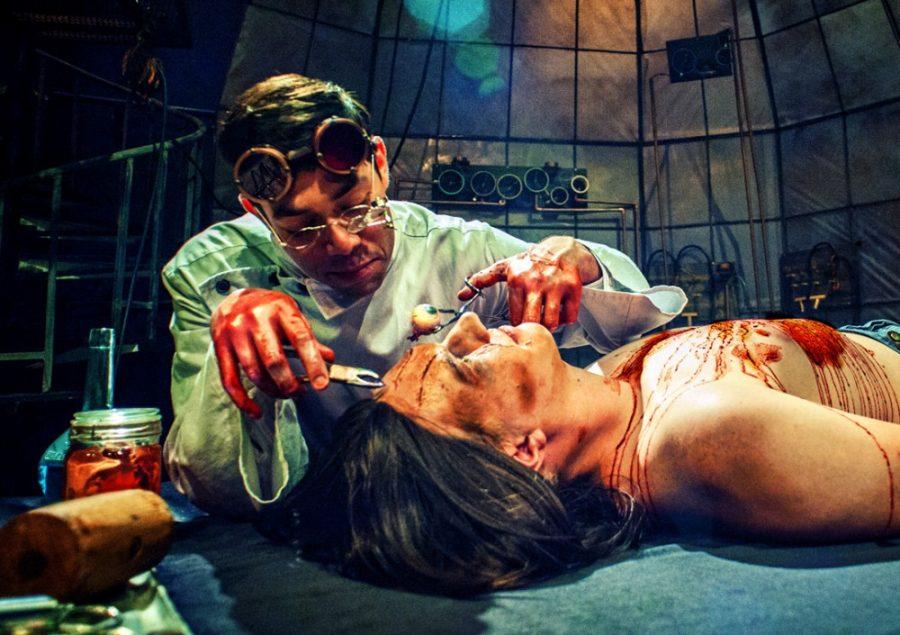Brent Gibbs is a director who really knows his audience. As the artistic director of a college theater program, he overloads productions with theatrics to better attract a millennial audience.
“Frankenstein” is his latest installment of this fantastical storytelling for Arizona Repertory Theatre, and the director puts out all the stops in this adaptation of Mary Shelley’s Gothic novel. Vomit, fire and blood all spew about the stage as Victor Frankenstein cowardly avoids confronting his undead creation.
The thunderous vibrations of sound effects rumble underneath the audience seating to give the impression that you’ve just boarded a Disneyland ride. But don’t expect the same happy resolution, such as that after riding the Pirates of the Caribbean, as “Frankenstein” uncontrollably descends upon a path of murder and mayhem.
These gory gimmicks are all pleasing for entertainment purposes, but they quickly become a cheap distraction from the greater questions Shelley’s novel originally posed in the 19th century.
What are the consequences of man playing God? What happens when science attempts to solve all of life’s mysteries? What makes one human? Valid ideas that get mere mentions in the calmer scenes of the play, but are overshadowed by the towering presence of the Creature whenever he enters the stage.
This production does an astounding job with visual aesthetics, but the journey of redemption for Frankenstein goes unfulfilled. The audience is left hanging without seeing how the hubris-ridden scientist realizes the faults in his actions.
The production team is not to blame for this imbalance; rather, Hollywood is at fault for saturating the cultural ethos of Shelley’s story with horror movie clichés. The audience has been conditioned to react more strongly to the merciless violence wielded by Frankenstein’s monster than by the thought of a man manipulating nature.
The playwright, Victor Gialanella, seems unsure of how best to adapt Shelley’s tale. On one hand, he slyly slips in analogous references to the Prometheus myth, which masterfully parallels Frankenstein’s fatalistic outcome. But then, Gialanella sloppily truncates the second act with a series of horrific actions to the point where the audience becomes emotionally immune when a major character is killed off.
Due to this inconsistent structure, it’s difficult to identify where the climax is in the play, as there is no grand showdown between man and monster. Gialanella makes Frankenstein exceedingly passive as his circumstances turn darker, and he quickly becomes an unflappable puppet reacting to a sinking ship. This isn’t the Frankenstein I remember from my high school English class.
Shelley’s protagonist is passionate, maniacal and foreboding; Gialanella’s interpretation overwhelms Frankenstein with so much tragedy, that there is no time to explore the complexity of his rash judgments. It’s as if William Shakespeare were to erase Lady Macbeth’s sleepwalking scene and cut straight to her off-stage suicide.
Despite these literary quibbles, this production is stunning with its technical design and student talent. Scenic designer Peter Beudert deserves recognition for transforming the malleable Tornabene Theatre into a graveyard, laboratory and Victorian sitting room all in the same space; it’s almost as if he were a mad scientist himself.
Costume designer Patrick Holt avoids the familiar green makeup and metal bolts made famous by Boris Karloff and stitches together an original, nightmarish wardrobe for the Creature to make him appear like the leader of the Trench Coat Mafia.
Senior musical theatre major Micah Bond delivers an impressive performance as the Creature, granting him plenty of sympathy for his unholy circumstances without sacrificing any of his monstrously vengeful tendencies.
The rest of the cast includes student actors Carli Naff, David Hentz, Bryn Booth, Hunter Hnat and Heather Cox. Matthew Bowdren, who plays Frankenstein, is currently completing a post-graduate fellowship in acting and earned a master’s of fine arts from the University of Georgia.
Incredibly complementary of the Halloween season, “Frankenstein” will surely give plenty of kicks for local horror junkies. But I’d recommend sticking to Shelley’s book if you’re looking for a thrill to permeate your subconscious.
_______________
Follow Kevin C. Reagan on Twitter.









